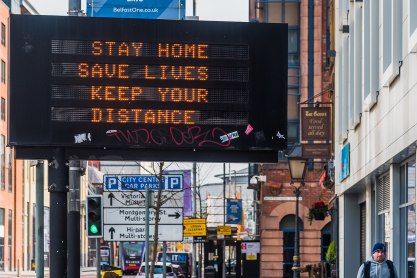The Covid-19 pandemic has been a disaster – but will it also be a lost opportunity?
An electronic display normally used for traffic management displays COVID19-related advice on an almost deserted street in Belfast city centre. Photo: Gerry Lynch/Wikimedia Commons
In the early weeks of the Covid-19 pandemic, there was much talk that the necessary precautions would encourage us to rethink how we conduct our lives, and what we really value. Traffic noise subsided, birdsong rang out in cities, wild animals roamed town centres, and ecosystems began to heal. Aircraft noise all but disappeared, the sky was no longer criss-crossed with con trails, and air pollution was significantly reduced. Having learned that meetings and conferences can take place online, we would travel less. We would walk or cycle to work. We would value nature more.
A hundred days on and 55,000 dead, the soul-searching, the solidarity, the ‘Blitz Spirit’ and the applauding of health workers have crumbled. Politicians bluff and bluster, the streets are as busy with traffic as ever, while large swaths of the public behave like toddlers throwing a tantrum because Mummy and Daddy won’t let them play outside, crowding into parks and on to beaches, strewing them with litter and defecating into Styrofoam takeaway boxes.
It’s beyond my understanding. I’ve been no further than the local shop in three months, and do you know what? It’s perfectly OK. ‘All of humanity’s problems,’ wrote Blaise Pascal in the 17th century, ‘stem from man’s inability to sit quietly in a room alone.’ Sadly, it seems that many people lack the patience, the imagination or the inner resources to heed his advice.
Last week, Boris Johnson told the House of Commons that ‘our long national hibernation is beginning to come to an end’, despite the reservations of the government’s own medical advisors. In the interests of reviving the economy, ‘non-essential’ shops and pubs will reopen and restrictions on holidays abroad will be eased – if you can find anywhere willing to admit a horde of drunk, disorderly and potentially disease-ridden Brits. This week Johnson announced his ‘New Deal’ under the slogan ‘Build, build, build’. Aside from the fact that the sum available was widely criticised as inadequate, it was typical, pre-Covid hard-hat thinking, promising to relax planning laws with a jibe at ‘newt-counting delays’.
While the construction and airline industries are considered too important to fail, arts organisations are forced to make sweeping redundancies, with some facing closure. Last week Sir Simon Rattle, conductor of the London Symphony Orchestra, the violinist Nicola Benedetti, the trumpeter Alison Balsom and the cellist Sheku Kanneh-Mason had an online meeting with the Culture Secretary Oliver Dowden to discuss the perilous situation of the UK’s orchestras. These world-renowned musicians got just 40 minutes – does the DCMS budget not run to a professional Zoom subscription? – and received little in the way of reassurance.
The arts contributed £10.8 billion a year to the UK economy, and £2.8 billion to the Treasury through taxation last year, though our government clearly considers the sector even more ‘non-essential’ than, say, scented candles. But then philistinism is deep-rooted in the British public, and Johnson is adept at playing to the gallery.
Meanwhile, the Arctic is on fire, scientists have warned that UK temperatures could reach 40C regularly by end of the century, and a report by the Institute for Public Policy Research (IPPR) has concluded that a historic disregard for the destruction of nature has left Britain ‘acutely vulnerable’ to its effects and entirely unready to meet the challenge.
Of course we need to save jobs, but in the longer term we need to think hard about what sort of jobs we should be creating. Last autumn, New Zealand’s prime minister Jacinda Ardern challenged the tendency to measure success by economic growth and GDP. ‘Economic growth accompanied by worsening social outcomes is not success,’ she told the Bill & Melinda Gates Foundation. ‘It is failure.’
We need to find a better way of ensuring the health of the economy than persuading us to go on buying more and more stuff we don’t actually need, and taking three or four foreign holidays a year.
The Covid-19 crisis has been described as a huge opportunity to rethink the way we organise society. But on the present evidence, I fear it will be a missed opportunity. The best I can manage is Gramsci’s ‘pessimism of the intellect, optimism of the will’.
But when the so-called developed world really begins to feel the effects of climate change, Covid-19 will look like, well, a walk in the park.

